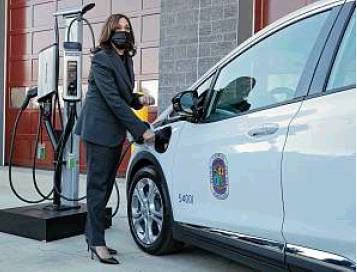Battery costs drain electric vehicle push
By Shelby Webb STAFF WRITER
Despite dramatic drops in price and increases in efficiency in electric vehicle batteries, far more improvements will need to be made for more Americans to be enticed into buying them, according to a new report from the Federal Reserve Bank of Dallas.
Only about 2 percent of cars sold in recent years are electric, according to the Fed, citing consumer concerns about large upfront costs and the limited distance a vehicle can go on a full battery.
Most electric vehicles use lithium-ion batteries, which cost just under $500 per killowatt hour — still too expensive for most consumers, experts say.
Though the cost of EV batteries has fallen by almost 98 percent since they were first produced in 1991, according to the Fed report, most of that decrease has come within the past 10 years, energy information firm IHS Markit says, declining by 82 percent from 2012 to 2020.
The prices of two types of lithium-ion batteries used in vehicles — nickel manganese cobalt and nickel cobalt aluminum — are expected to fall below $100 per kilowatt-hour by 2024. The average price of a lithium-ion battery cell is expected to fall to $73 per kilowatt hour by 2030, according to IHS Markit.
To help bring down prices, some scientists are experimenting with silicon instead of more expensive minerals like nickel and cobalt in battery production.
The Fed warned, however, that developing more efficient and cheaper batteries could take decades. Lithium-ion batteries, for example, were first researched in the 1970s but a prototype wasn’t introduced until 1986. It took another five years for them to become available commercially.
Disrupting existing supply chains of current lithium-ion batteries with new technology could further delay wider use, the Fed said.
“Still, past developments suggest that we should expect to see further battery improvement,” the report said. “But exactly what that looks like, when it occurs and which developers will reap the spoils from that success are difficult to predict.”
Nevertheless, carmakers are moving swiftly to bring new electric vehicles to market.
Tesla is constructing a gigafactory outside Austin to produce electric cars, pickup trucks and batteries. The manufacturing plant is expected to be completed next year.
General Motors in January said it would produce only electric vehicles by 2035, the same year that California’s ban on the sale of new gasoline-powered vehicles goes into effect.
And Ford unveiled the F-150 Lightning, an all-electric version of its best-selling F-150 pickup, in May. The automaker has committed $11.5 billion to convert some of its most popular vehicles to run on batteries. shelby.webb@chron.com
